Neil Wegenschimmel
Published August 2025
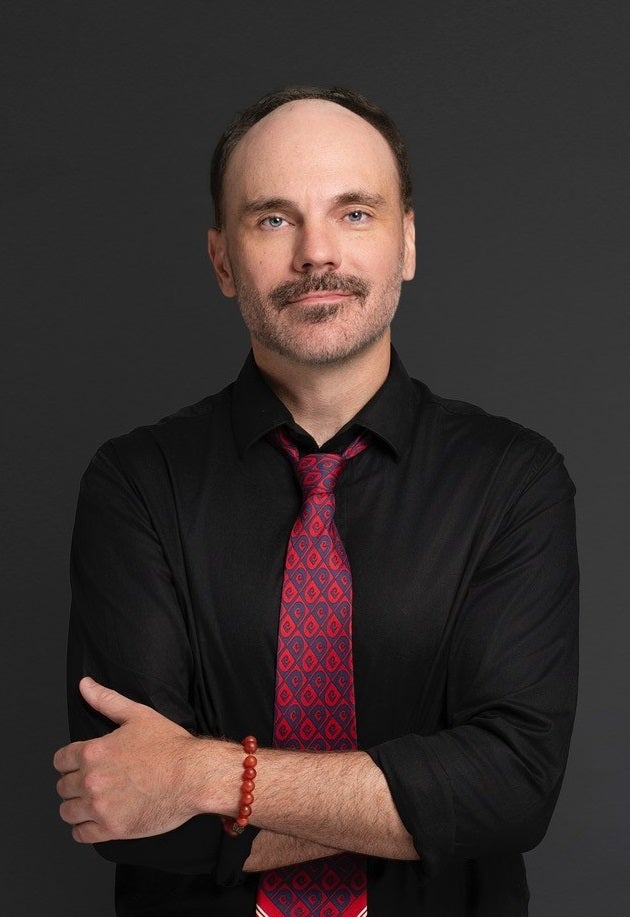
Neil is a PhD candidate in the Decision, Inference, and Cognitive Economics (DICE) lab under the supervision of Dr. Samuel Johnson. His research focuses on understanding manifestations of extreme political belief and the social, cognitive, and environmental factors that inform these belief structures, as well as their impact on social networks and political outcomes.
In particular, he examines how individuals navigate existential uncertainty in social, political, and informational domains, with an emphasis on the role of conspiracy mentality and existential nihilism in shaping authoritarian attitudes across the political spectrum. His work, spanning multiple studies across the United States, United Kingdom, and Canada, reveals distinct patterns whereby certain cognitive dispositions inform both left- and right-wing authoritarianism. These findings also illuminate how emotional states such as loneliness and uncertainty indirectly foster authoritarian beliefs via patterns of thought, and how factual information alone may not be sufficient to shift perceptions that underlie extremism. Together, they carry implications for understanding belief formation in an era of misinformation and digitally mediated uncertainty.
Neil’s research has been supported by grants from SSHRC at both the Master’s and Doctoral levels, and he has presented his work internationally at conferences in the United States, Europe, and South Korea. He is a previous holder of the Mark Zanna Graduate Scholarship and was recently awarded the Canadian Psychological Association’s Certificate of Academic Excellence for his Master’s thesis.
Outside of research, Neil enjoys engaging in mentorship through the DICE Lab Summer Internship Program and teaching—most recently as an instructor for PSYCH 101 this past winter.
Neil was recently profiled by International Society for the Science of Existential Psychology.
Recent publications:
- Smith, J. A., Dorfman, A., Wegenschimmel, N., & Grossmann, I. (2025). Wisdom reconsidered: A dynamic network account of metacognition and complex thought. Journal of Experimental Psychology: General. Advance online publication. https://doi.org/10.1037/xge0001821
- Wegenschimmel, N., McLaughlin, N. (2024). The Great Canadian Paradox: Jordan Peterson, Right-Wing Canadian Internet Personalities, and the End of Canadian Exceptionalism? Society 61, 685–699. https://doi.org/10.1007/s12115-024-01025-0
Amy Barron
Published August 2025
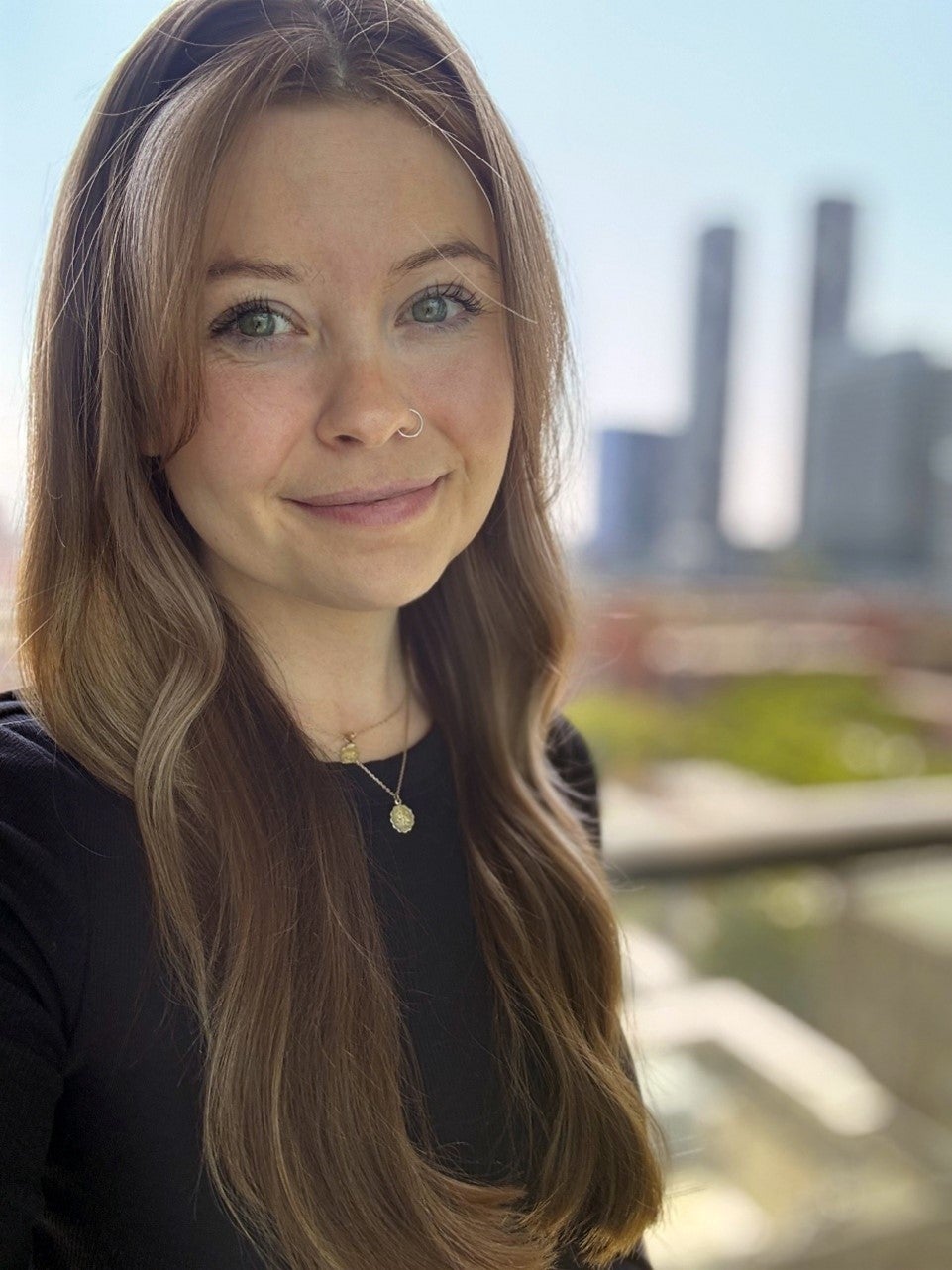
Amy Barron is a PhD candidate in the Industrial-Organizational Psychology program, working under the supervision of Dr. Ramona Bobocel. She has two complementary research streams aimed at examining biases that undermine managers’ fair treatment of their employees. In one line of research, she investigates how perpetrator performance biases how managers react and respond to workplace mistreatment claims. In a second research line, driven by her interest in gender equality, she examines how the gender of a recipient biases how managers deliver bad news such as negative performance evaluations. Through her research, Amy hopes to improve the way managers interact with their employees during these challenging situations.
Amy’s research has been supported by SSHRC grants and her contributions to the field have been recognized at prominent conferences, earning accolades such as the CSIOP Best Poster Award and the RHR Kendall Award. She has also recently been awarded the Outstanding Graduate Student Performance Award by the I-O Area in recognition of her research and service to the department.
Outside of research, Amy has been an instructor for PSYCH 492 where her dedication to her students and effectiveness as an educator has been recognized in her strong course evaluations and the Outstanding Teaching Assistant Award.
Candice Rubie
Published August 2025
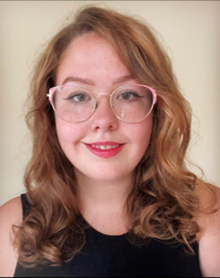
Candice is a 2nd-year PhD student in the Developmental Psychology program, working under the supervision of Dr. Stephanie Denison. Her research examines children’s cognitive development in early childhood, including their Approximate Number System (ANS) acuity, risk taking and attitude formation towards novel objects, and responses to failure feedback. Candice’s research has been supported by grants from SSHRC, NSERC, and OGS, and has been presented at several national and international conferences, including the Society for Research in Child Development, Cognitive Science, and the Society for Personality and Social Psychology.
Alongside her research, Candice thoroughly enjoys taking an active role in supporting student life, both within and beyond her department. She has taken on several meaningful volunteer positions to contribute to the university community, including serving as one of the lead organizers of the Psychology Discovery Conference, a project review committee member for the Graduate Student Endowment Fund, and former executive member of GASP. Candice is always eager to embrace new challenges and experiences, and to expand her skill set whenever possible. She is concurrently completing the Graduate Diploma in Computational Data Analytics for the Social Sciences and Humanities and the Certificate in University Teaching alongside her degree.
Samantha Ayers-Glassey
Published August 2025
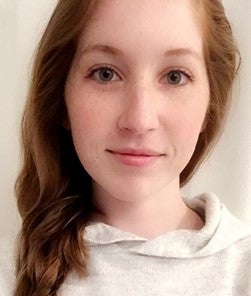
Samantha is a 4th-year PhD student in the Cognitive Neuroscience program under Dr. Daniel Smilek’s supervision. She has secured over $200,000 CAD in competitive research funding, including ranking in the top 5% of Psychology applicants for the prestigious NSERC CGS-D scholarship. Samantha is currently completing the Certificate of University Teaching. She enjoys teaching and mentoring undergraduate students as a sessional course instructor, teaching assistant, and honours thesis co-supervisor.
Samantha’s research focuses on how individuals monitor, recall, and adapt their cognitive experiences over time. Her dissertation investigates whether individuals can accurately report their previous momentary experiences of attention, which has involved co-developing a novel video-stimulated recall paradigm for capturing self-reported attention and exploring whether accurate reports are based on memory and/or metacognitive inference. This method stemmed partly from her experience using a similar approach to study self-perceptions in second-language learners during her undergraduate studies.
Samantha has also explored attention and affect in contexts such as attention-deficit hyperactivity disorder (ADHD), social media scrolling, and video-mediated communication using multiple methods (self-report, behaviour, psychophysiology), and the paradoxical experience of ADHD ‘hyperfocus’. Her research is highly collaborative, involving co-authors in Ontario, Nova Scotia, New Brunswick, and the United States, as well as over 30 undergraduate trainees, graduate peers, and postdoctoral fellows at the University of Waterloo.
Following completion of her PhD, Samantha looks forward to pursuing postdoctoral research opportunities where she can expand her collaborative network and investigate the neural correlates of retrospective judgments of attention.
Recent publications:
- Ayers-Glassey, S., Pereira, E.J., Wammes, J.D., & Smilek, D. (2025). Retrospective attention: Examining temporally specific retrospective reports of mind wandering and engagement during online video lectures. Psychological Research, 89, 103. https://doi.org/10.1007/s00426-025-02133-0
- Pereira, E.J.*, Ayers-Glassey, S.*, Wammes, J.D., & Smilek, D. (2024). Attention in hindsight: Using stimulated recall to capture dynamic fluctuations in attentional engagement. Behavior Research Methods, 56, 5354-5385. https://doi.org/10.3758/s13428-023-02273-4 (*Equal contribution)
Serena McDiarmid
Published August 2025
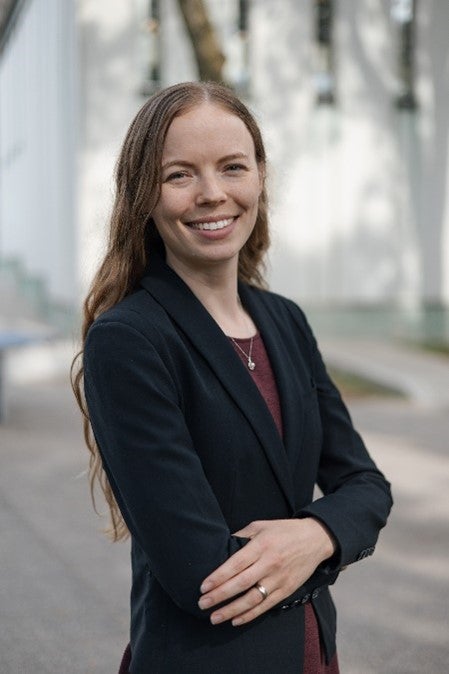
Serena is a PhD student in the Developmental Psychology program, working under the supervision of Dr. Heather Henderson. Serena is a Vanier Scholar, educator and leader with 7+ years of experience in the field. Serena is a trained teacher, receiving her Bachelor of Education at Wilfrid Laurier University. She utilizes these skills as an award-winning sessional instructor (Renison University College and UW’s Psych department), co-developer of the “Wicked Problem of Precarity” course, and in positions with UW’s Centre for Teaching Excellence where she notably developed UW’s Trauma-Informed Teaching workshop.
As a researcher, Serena focuses on mixed-methods, community-based projects that support youth in school and community settings. Her current work focusses on measuring and bolstering youths’ sense of belonging. Previously, her worked has focused on youth with a refugee background and she supported the Horizons 2020 RefugeesWellSchool project through a Mitacs GlobaLink award.
In the community, Serena serves as a Project Coordinator for the Measurement for Change Team, bringing effective measurement skills and tools to community organizations. She also serves on the Board of Directors for Emmanuel Early Learning and Care Centre where she is working to expand access to non-profit Forest and Nature Childcare in Waterloo Region and improve the wages and working conditions of early childhood educators in Ontario.
- Follow Serena on LinkedIn or Google Scholar
- Learn more about the Measurement for Change Team
- View Serena’s submission to the 2024 University of Waterloo GRADflix Competition which earned an Honorable Mention
Khalil Husein
Published August 2025
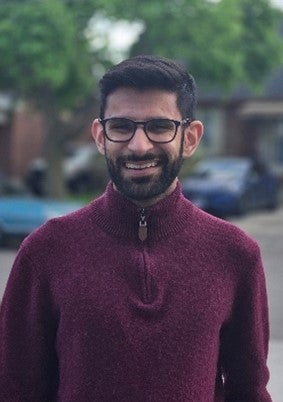
Khalil is a 1st year PhD student in Cognitive Neuroscience, supervised by Dr. Myra Fernandes. He recently completed his master’s, where he explored the mechanisms behind music’s unique ability to bring back past personal memories. He examined what components of music, the lyrical or the instrumental elements, are important in music’s capacity to cue memory. He studied this across the lifespan, which is especially important in identifying music’s potential in supporting recall in older adults, who often report difficulty remembering past events. Khalil found that, remarkably, music can become an even more potent cue across the lifespan. His work suggests that music’s enhanced cueing ability in older adults originates from its lyrical elements. Khalil is now extending this work to study music’s cueing effectiveness in individuals with Alzheimer’s disease.
Working with Dr. Marek Stastna, Khalil has also examined how natural language processing tools can determine the emotionality of memory narratives. He compared the effectiveness of two popular algorithms, VADER and TextBlob, and identified approaches to more fully harness their capabilities.
Khalil has received funding at the provincial (QEII-GSST) and federal levels (NSERC CGS-M; PGS-D) and his work has received recognition from organizations such as the Canadian Psychology Association (CPA) and Canadian Society for Brain, Behaviour & Cognitive Sciences (CSBBCS).
Khalil is excited to expand on his work in cued autobiographical memory in his PhD. He is also looking forward to stepping into the role of GASP President and coordinator of the WRAP participant pool. He would like to thank Dr. Fernandes and everyone in the department for creating a constantly supportive community and rewarding learning environment!
Khalil was recently profiled as an emerging researcher on the Network for Aging Research Website.
Sarah English
Published August 2025
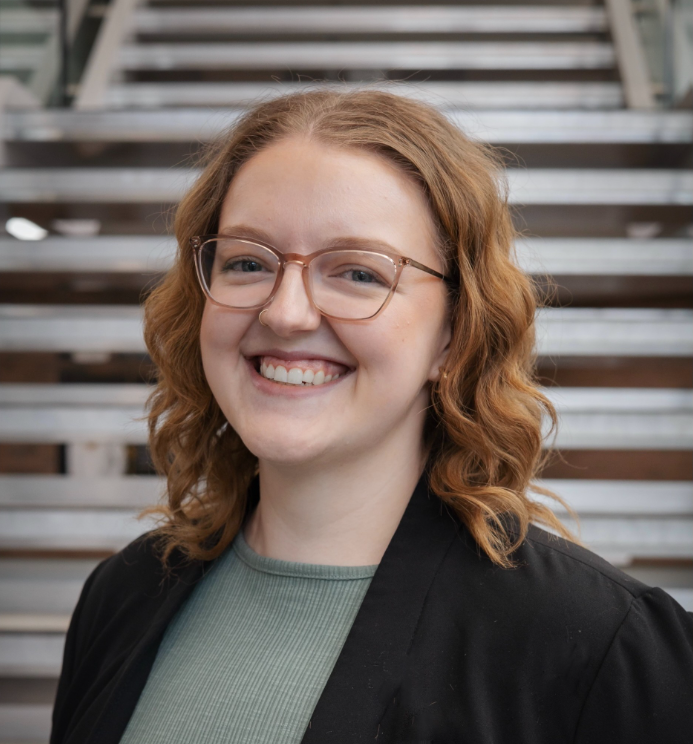
Sarah is a 5th-year PhD student in Developmental Psychology, working under the supervision of Dr. Heather Henderson. Her research examines how children navigate the complexities of forming and maintaining friendships, with a focus on how they use affiliative language (i.e., language that expresses a desire to connect and helps foster closeness with peers) to build social connections. Sarah investigates the multiple motivations that shape affiliative behaviour, including temperamental traits, moment-to-moment perceptions of how one is viewed by their peers, and situational factors such as social exclusion. By exploring the subtle role of language in shaping children’s social worlds, her work offers valuable insights into the everyday building blocks of healthy peer relationships. Sarah’s research has been supported by several competitive scholarships, including the Ontario Graduate Scholarship, SSHRC CGS-M, and the SSHRC Doctoral Fellowship, and has been shared at national and international conferences including the Society for Research in Child Development, the Occasional Temperament Conference, and the Canadian Psychological Association.
Beyond her research, Sarah is deeply committed to fostering community within the department. As a core member of the Psychology EDI Working Group, she is a facilitator for the Lift Psychology Undergraduate Mentorship Program, a lead organizer of the Psychology Discovery Conference, and an advocate for student well-being through the Healthy Labs initiative. As a graduate representative on various departmental and Arts faculty committees, and former Vice President of GASP, Sarah continues to actively advocate for students in discussions around curriculum, hiring, and policy. She is equally passionate about teaching and mentorship, having taught courses in Developmental Psychology and an advanced seminar on the (often overlooked) strengths of shy children.
Sophia Tran
Published August 2025

Sophia is a 4th-year PhD candidate in Cognitive Neuroscience working under the supervision of Dr. Myra Fernandes. She is currently studying how encoding techniques, such as drawing, enhances later recall of to-be-remembered items. She is primarily interested in how the drawing benefit can be modulated by stimulus-driven factors. More specifically, the bulk of her research has focused on delineating which encoding techniques are the most effective at grounding abstract concepts and facilitating higher-quality and higher-level learning. Finally, she has leveraged age-related neurological differences across the human lifespan (children to older adults) to examine the potential mechanisms underlying the drawing benefit.
Sophia has received several competitive awards and recognitions at the provincial, national, and the international level. These include the NSERC CGS-D, Ontario Graduate Scholarship, and the Canadian Psychological Association’s Student Research Grant. She has presented her work at renowned conferences, including the Psychonomic Society, Cognitive Neuroscience Society, and the Canadian Society for Brain, Behaviour, and Cognitive Science, among others.
Looking forward, she is interested in pursuing her postdoctoral studies.
Madeline Wiseman
Published August 2025
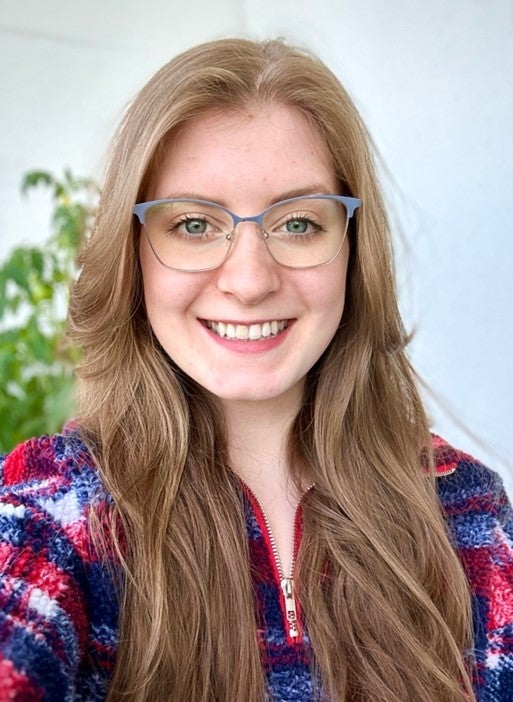
Madeline completed her BSc (Hons.) in psychology at the University of New Brunswick, and her MASc at the University of Waterloo. She is currently working towards her PhD in the Developmental Psychology program, working with Dr. Katherine White. Broadly, her main research interests pertain to language development and the social-cognitive aspects of children’s word learning. The goals of this research are to investigate how children learn language and how their social perceptions of informants affect their learning.

Jolie Ho
Published January 2025
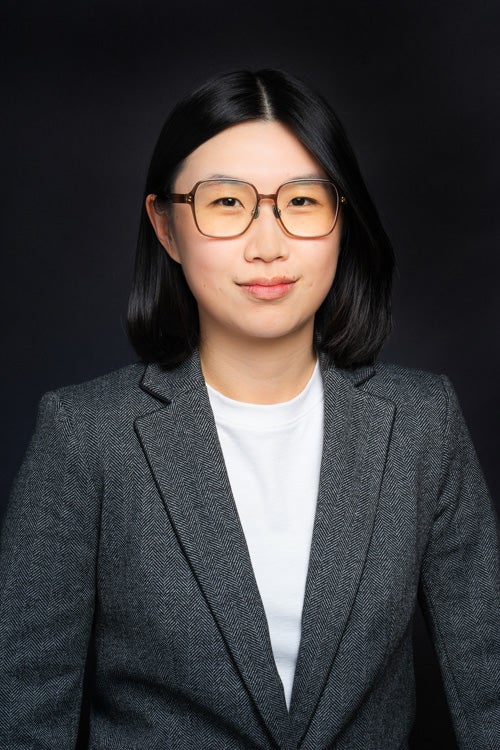
Jolie is a 4th year PhD candidate in the Clinical Psychology program, working under the supervision of Dr. David Moscovitch, whose program of research focuses on how we can best connect with one another to access compassion, care, and support. This is especially important for socially anxious individuals, who fear being judged and criticized by others and thus try to conceal their true selves using safety behaviours (e.g., staying silent, avoiding eye contact), inadvertently blocking opportunities for positive social experiences. One of Jolie’s studies found that, amongst individuals with clinically significant symptoms of social anxiety, fears of receiving compassion from others predicts greater use of these types of maladaptive safety behaviours. Recently, Jolie also conducted a study using a smartphone-based app to examine fears of receiving compassion and safety behaviour use as they unfold in real-time during social interactions in daily life. Jolie’s research is supported by grants from SSHRC and OGS and her work has been recognized by organizations such as the Canadian Psychological Association (CPA) and Canadian Association of Cognitive Behavioural Therapies (CACBT).
In her clinical training, Jolie has developed a strong background in assessing and treating anxiety and mood disorders, in addition to PTSD, emotion regulation issues, and interpersonal concerns, using a variety of evidence-based approaches. Over this past year, she has been completing a clinical placement at the Breakwater Institute focusing on trauma-informed treatment for first responders. Jolie looks forward to completing her predoctoral residency at the Centre for Addiction and Mental Health (CAMH).
Recent publications:
- Ho, J.T.K., Dupasquier, J.R., Scarfe, M.L., & Moscovitch, D.A. (2021). Fears of receiving compassion from others predict safety behaviour use in social anxiety disorder over and above fears of negative self-portrayal. Journal of Anxiety Disorders, 80, 102387. https://doi.org/10.1016/j.janxdis.2021.102387 2.
- Ho, J.T.K., & Moscovitch, D.A. (2021). The moderating effects of reported pre-pandemic social anxiety, symptom impairment, and current stressors on mental health and affiliative adjustment during the first wave of the COVID-19 pandemic. Anxiety, Stress, and Coping, 1–15. https://doi.org/10.1080/10615806.2021.1946518.
Yadurshana Sivashankar
Published January 2025

Yadurshana is a 4th-year PhD candidate in Cognitive Neuroscience at the University of Waterloo, working under the supervision of Dr. Myra Fernandes. Her research examines the relative contribution of decision-making strategies and motor control to spatial memory across various age groups, using innovative methods like Virtual Reality (VR) and driving simulators. To this end, her research makes use of simulated environments that mimic real world cities around the world.
Yadu’s experience extends beyond her doctoral research. As a Visiting Research Scientist at KITE (Toronto Rehabilitation Institute; UHN) and INRIA in Bordeaux, France, she collaborated with experts in cognitive science, machine learning, and simulation technologies. At KITE, she studied age-related changes in navigation abilities with Dr. Jennifer Campos. At INRIA, she designed experiments exploring how decision-making strategies, roadmaps, and landmarks impact route memory. Working with Dr. Jason Ozubko at SUNY-Geneseo, she combined VR and fMRI to study the effects of guided navigation on spatial memory and neural activation patterns.
Yadu earned the Certificate in University Teaching, and has taught courses at Wilfrid Laurier University (Human Neuropsychology), receiving high student evaluations. She actively serves as a peer reviewer for multiple academic journals and as a committee member for conference societies, assisting with event organization. Yadu has received several competitive awards and recognitions at the provincial, national, and the international level. These include the NSERC CGS-D, Ontario Graduate Scholarship, WiCS-Canada Research Seed Grant, CPA Student Research Grant, and the INRIA and UW Collaboration grant. She has presented her work at renowned conferences, including the INAV Research Symposium, Cognitive Neuroscience Society, International Neuropsychological Society, and the Canadian Society for Brain, Behaviour, and Cognitive Science, among others.
Looking forward, she is interested in pursuing her postdoctoral studies.
Laura Colucci
Published January 2025

Laura is a 4th year Ph.D. student in the Clinical Psychology program, working under the supervision of Dr. Dillon Browne. As part of the FamilyPsycle Lab, she is passionate about researching family dynamics at different levels of analysis.
With expertise in the family stress model and family systems theory, Laura’s SSHRC-funded dissertation research is exploring longitudinal outcomes following parent-focused Emotion-Focused Family Therapy (EFFT) - an attachment-based intervention that can effectively fortify family relationships and support children’s mental health recovery. Consistent with the theoretical pillars of family psychology and developmental science, Laura’s research uses advanced statistical methods like multilevel modelling in order to investigate the bidirectional nature of family relationships, across multiple layers of the family system.
As a testament to the quality of her research skills, Laura has frequently published and presented her work at local, national, and international conferences, across the domains of family stress, screen-time assessment, coping with adversity, childhood trauma, psychosis, and parent well-being during COVID-19. She has also thrived within academic leadership roles, including invited peer review, community education, and mentorship of junior students.
- Stay up to date with Laura’s research on Google Scholar.
- Learn more about the exciting projects happening in the FamilyPsycle Lab.
Jessica Trickey
Published 2024

Jessica Trickey is a 3rd year PhD candidate in Social Psychology at the University of Waterloo, supervised by Dr. Hilary Bergsieker. Her doctoral research delves into the influence of perceived psychological standing to confront discrimination as a function of group membership. Traditionally, psychological standing is viewed as a singular construct; however, Jessica’s research is pioneering in its examination of standing as comprising two related but distinct constructs: relevance to the issue and responsibility to challenge the issue. Her work finds that these components, though positively correlated, have differential effects on expected backlash for challenging discrimination, posing a potential mechanism for allyship behaviour.
Jessica's M.A. research focused on the impact of company inclusion cues, including leader profiles, diversity statements, and external employee reviews, promoting allyship and advocacy against discrimination. Her findings demonstrated that inclusive cues significantly enhance intentions to act as allies and advocates for individuals higher in conservative political identification, thereby fostering a more supportive and proactive community against bias.
Jessica's subsequent studies will explore the link between perceived standing and allyship behaviour intentions as well as understanding perceptions of who is most appropriate to confront discrimination. Through her program of research, Jessica aims to understand and catalyze allyship behaviour from privileged group members to build a more inclusive environment for marginalized group members.
Throughout her graduate career, Jessica has been an active member of the Engendering Success in STEM (ESS) research consortium. In this role, she has contributed to the development and analysis of interventions aimed at increasing allyship behaviour and improving fit and inclusion within STEM organizations. The ESS project has involved active collaboration with several organizations to conduct longitudinal field studies that apply existing social psychological theory to applied organizational settings. Findings from this research program include the potential for inclusion workshops, relative to STEM-typical leadership skills workshops, to increase allyship behaviour and the recognition of gender bias, as well as the unique positive impacts of allyship from men for women’s outcomes (e.g., fit and engagement) in STEM.
Jessica has also served as Equity, Diversity, and Inclusion (EDI) manager for the University of Waterloo Alternative Fuels Team (UWAFT), a student design team in the Faculty of Engineering. Her role has involved data analysis, designing and implementing initiatives to promote EDI, and creating plans for outreach with Indigenous communities, including the Six Nations of the Grand River. Additionally, she has served as the social area’s Brown Bag coordinator and the social area representative for the Graduate Association for Students in Psychology (GASP).
Jessica's dedication to her field is evident through her awards and recognitions, such as the Social Sciences and Humanities Research Council Master’s Award, the Ontario Graduate Scholarship, and the Mark Zanna Graduate Scholarship. Her scholarly contributions are also marked by a range of presentations at prestigious conferences, including the Network Gender and STEM in Heidelberg, Germany, the Society for Personality and Social Psychology in the United States, and the Canadian Psychology Association.
Looking ahead, Jessica aims to continue integrating her research with practical applications, contributing to the academic community and beyond by fostering environments that challenge discrimination and support diverse group dynamics. Her rigorous training and innovative approach to research have equipped her to make significant contributions to both the academic and applied aspects of social psychology.
Check out some of Jessica’s research and service work:
Diversity and Intergroup Relations Lab
University of Waterloo Alternative Fuels Team
Amy Minnikin
Published 2024

Amy is a 4th year Ph.D. candidate in the Industrial-Organizational Area supervised by Dr. James Beck. Amy’s research focuses on feedback in the workplace. Specifically, Amy is interested in the contributions and perspective of the feedback source to feedback processes. Feedback has been linked to many positive outcomes, such as improved performance, greater well-being, and higher job satisfaction. However, providing detailed, specific, and sensitively delivered feedback requires managers to allocate a great deal of time, energy, and attention. Managers tend to face many competing demands on these resources, and thus, providing feedback to subordinates sometimes falls by the wayside.
Additionally, interpersonal factors also influence managers’ feedback behaviour. Providing feedback, particularly negative feedback, can be awkward and uncomfortable. As a result, managers sometimes avoid providing negative feedback, even though the would-be recipient could benefit from hearing it. If managers don’t put in the effort needed to providing feedback, many stakeholders lose out on the associated benefits of high-quality feedback.
Amy’s dissertation focuses on identifying one potential roadblock that prevents managers from putting sufficient effort into providing their subordinates with feedback: manager perceptions of subordinate mental health. That is, managers may not allocate as many resources to providing feedback to subordinates whom they perceive to have poor mental health for two reasons. First, managers may have a lower perceived likelihood that the subordinate will be able to make performance improvements. Second, managers may have a higher perceived likelihood that the subordinate will have emotional reactions to the feedback received.
She continued her 5-year streak of presenting at the Society for Industrial and Organizational Psychology Annual Conference this year by presenting a poster providing support for the above predictions. Amy published her Master’s thesis in the Journal of Buisness and Psychology, and has received support from both SSHRC and OGS. This year, she received the Industrial-Organizational Psychology Award at UW.
Amy chose to pursue her Master’s degree in I-O at UW because she was interested in a career in which she could apply psychological concepts to real-world problems. At the end of her master’s, she felt she still had more to accomplish, and much more to learn from her supervisor. Thus, although not initially her plan, she decided to stay for her Ph.D. Amy is grateful to her supervisor, James, for his support over these many years. She is particularly thankful for his ability to teach whole courses worth of complex statistical concepts in a one-hour meeting. She would also like to thank the other faculty in the I-O division for their willingness to help and provide constructive feedback!
Sydney Waring
Published 2023
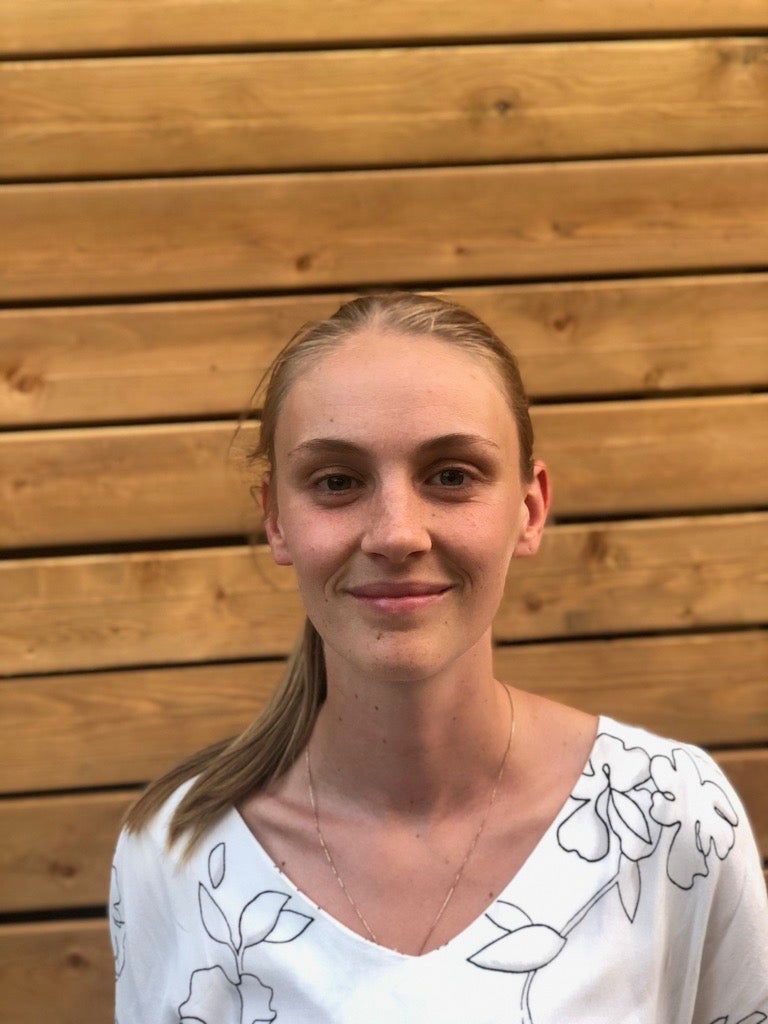
Sydney is a recent graduate of the Clinical Psychology PhD program where she was supervised by Dr. Allison Kelly. Sydney’s research focuses on how women’s body image changes depending on whom in their life they are spending time with. While this reality may seem intuitive, researchers and clinicians have tended to conceptualize body image as an individual experience that is relatively stable. Sydney’s program of research was the first to show empirically that body image is actually quite relational and unstable. Specifically, she found that the way a woman feels about her body is quite variable across their specific relationships, and that certain perceived characteristics of others actually influence how she feels about herself and her body. For instance, Sydney’s research has found that women feel better about their bodies when they are with people whom they perceive to be accepting of their bodies and worse about their bodies when they are with people whom they perceive to be preoccupied by things like fitness, dieting, and exercise.
Interestingly, Sydney’s research has also shown that relationships impact some women’s body image more than others, with body-dissatisfied women showing the most extreme changes to their body image across their specific relationships. Given this finding, Sydney has also used qualitative methods to investigate the unique ways body-dissatisfied women perceive the influence of their different relationships on their body image. This work has shown that often relationships influence women’s bodies in idiographic and complex ways, suggesting the importance of person-centered interventions to help women improve their body image. Sydney has published all of her dissertation studies in the journal Body Image, and her work has also garnered attention among local media outlets.
Sydney has also worked with Dr. Kelly on an intersecting research interest in disordered eating and compassion-focused intervention. This line of research has demonstrated that it is not only our relationship with others that influence our body image, but also our relationship with ourselves. In particular, Dr. Kelly and Sydney’s research has shown that learning how to approach one’s struggles with understanding, non-judgement, and compassion has been shown to improve a range of symptoms related to disordered eating. Sydney has presented her intersecting lines of research at a range of conferences held by the Society for Personality and Social Psychology, the Academy for Eating Disorders, the Eating Disorders Research Society, and the Society for Interpersonal Theory and Research. Throughout her graduate training, Sydney has also received funding at the provincial (OGS, QEII‐GSST) and federal levels (CIHR, SSHRC).
With all of her research, Sydney has a particular interest in research-practice translation and thus making sure that findings learned in the lab are available to those who need it. Given her clinical training, she has a specific interest in clinical applications of her research findings. For instance, she has worked to help apply her lab’s research on self-compassion clinically through collaborating and consulting with a range of active Eating Disorder programs including St. Joseph’s Eating Disorder Program, Canadian Mental Health Association – Waterloo Wellington, and Nova Scotia Health to help develop brief interventions that focus on self-compassion. In addition, she has found ways to spread awareness about how relationships are a key contributor to individual body image through speaking with a range of media outlets, as well as key interest groups such as Waterloo Sororities and the UW Women’s Centre.
Next steps for Sydney include undergoing registration as a clinical psychologist, and finding ways to continue to integrate, apply, and produce research in her new applied role in the Waterloo community. Sydney credits learning to be a scientist-practitioner through her rigorous and innovative training at UWaterloo, which continuously found ways to blend research and clinical application. Sydney is most grateful for the way her graduate training in Psychology was able to provide both an intellectually challenging and interpersonally supportive environment. A balance between both these elements was key to Sydney’s success and satisfaction throughout her graduate studies at UW.
Pelin Tan
Published 2022

Pelin is a second year PhD candidate in the Cognitive area who is supervised by Colin MacLeod and Myra Fernandes. Pelin's research focuses on how we selectively remember important information.
Broadly, Pelin's interests focus on the cognitive basis of controlling unwanted memories. Specifically, her research focuses on intentional forgetting which is the type of forgetting we do on purpose to select some items for commitment to long-term memory and to discard others. Furthermore, Pelin's line of research primarily focuses on intentional forgetting as an essential memory updating tool.
Sometimes, remembering is an undesired outcome. For example, we do not want to remember an old locker combination or old hotel room number; purging that information out of memory helps declutter it. Another example of intentional forgetting is when memories are emotional and/or traumatic, we do not benefit from ruminating or constantly remembering them, so we may want to forget these memories on purpose.
Most of Pelin's work has focused on the role of cognitive processes (e.g., rehearsal, inhibition, context) in forgetting unwanted information. In a recent study, Pelin and her collaborators challenged the role of memory suppression in intentional forgetting (Tan, Ensor, Hockley, Harrison, & Wilson, 2020), and emphasized rehearsal as the core process in how we discard irrelevant information from memory. Currently, she is continuing this line of work by examining the role of contextual information in intentional forgetting, divided attention, and methods to promote forgetting of unwanted memories.
In another line of research, Pelin looked at to what extent we continue to remember information we intended to forget. So more clearly, do we actually intentionally forget a memory?
Pelin's research, so far, has shown that an intention to forget weakened the details people remember about a memory (e.g., the colour of the tablecloth in a picture), but did not affect their ability to remember the “gist” of the memory (e.g., there was a tablecloth). Pelin concludes from this that perhaps intentional forgetting is a strategic method to reduce accessibility to unwanted memories, without actually discarding these memories from our mind. She hopes to continue this line of research to offer unique insights into how other memory and attention systems are influenced by intentional forgetting.
In the end, Pelin hopes that her research can build towards a clearer understanding of how we intentionally forget. That means this knowledge could be applied to clinical populations (e.g., patients with PTSD) to promote forgetting unwanted memories, and also new technologies (e.g., artificial intelligence) to prevent information overload.
Pelin recently presented her research at Psychonomics Society, Canadian Society for Brain, Behaviour & Cognitive Science, and Association for Psychological Science.
Pelin currently serves as the Student Executive, Member-at-Large for the Canadian Society for Brain, Behaviour & Cognitive Science, where she advocates for student involvement in the Society and providing more opportunities (e.g., networking events) for students. She is also involved in the Equity, Diversity and Inclusion committee for this Society to further investigate these topics in an academic setting.
Pelin cites the endless amount of professional development opportunities throughout the university as her favourite thing about UW. She enjoys taking classes from different departments to learn about research and new technologies. Another graduate student opportunity is the graduate diploma in computational analytics for the social sciences and humanities. This diploma focuses on training graduate students in coding, data interpretation and visualization from a multi-disciplinary perspective. She really loves the fact that UW has these opportunities that will be extremely helpful for her future career.
Pelin appreciates how helpful everyone in the Department of Psychology is. She credits the very supportive faculty and student community who have made her experiences rewarding. Pelin appreciates having friends and colleagues who she can collaborate with and who continue to challenge her and support her every day. She will also cherish the friendships she has formed here for the rest of her life. Pelin enjoys the "involved research environment. For example, I can just reach out to another faculty member or grad student just to discuss new developments in cognition and have a chat about research."
When asked what made her pick UW for graduate studies Pelin replied: "I love working with my supervisors, who are extremely supportive, patient, and excellent mentors. I solely came to UW to work with these supervisors who are both excellent within their fields and provide so many opportunities to me, that I could not have had at other institutions." She is also very happy that we don't have comps!
You can read more about Pelin's research:
In support of selective rehearsal: Double-item presentation in item-method directed forgetting
Directed forgetting for categorised pictures: Recognition memory for perceptual details versus gist.
Ryan Yeung
Published 2021

Ryan is a 3rd year PhD candidate in our Cognitive Neuroscience area who is supervised by Dr. Myra Fernandes. Ryan’s research focuses recurrent or intrusive memories. The classic example of this phenomenon is a taste or smell suddenly evoking a moment from your past, without even having tried to recall that moment. Studies have indicated that these involuntary memories are quite common in daily life, leading some to argue that they’re mostly benign or pleasant. On the other hand, involuntary memories are also thought to contribute to mental health issues, being most commonly associated with PTSD, depression, and anxiety. In other words, opposing perspectives exist about whether recurrent memories are harmless or harmful.
Ryan’s recent work with Dr. Fernandes has shown that both of these perspectives seem valid to some degree. First, recurrent memories were indeed experienced by the majority of our participants. Their work supports the view that recurrent memories occur too commonly among healthy populations to be considered only related to mental health disorders. Conversely, they found that properties of these recurrent memories (e.g., whether you consider the memory emotionally negative or positive) can predict symptoms of mental health issues: negative emotion was related to significantly more symptoms of depression, general anxiety, social anxiety, and PTSD.
Moving forward, Ryan will be working to characterize and compare these recurrent memories in different populations. For example, this previous study only surveyed young adults; they’ve since found some surprising similarities and differences in older adults. Although memories for the personal past tend to weaken in older age, they found that recurrent memories were just as common among older adults as young adults! However, older adults’ recurrent memories differed in that they were disproportionately positive in emotion, whereas young adults’ were disproportionately negative. Ryan believes that the properties of recurrent memories depend on the population sampled, and hope to explore these individual differences further.
Most recently, Ryan has been using machine learning to characterize the content of these memories. To date, very little is known about what recurrent memories are actually about, especially in general populations. Using thousands of participants’ text descriptions of their recurrent memories, Dr. Fernandes’ lab identified consistent topics such as friendships and car accidents, and quantified how prevalent these topics are. Further, they’ve found that symptoms of mental health issues predict participants’ use of these topics in unique ways. For example, preliminary analyses indicate that symptoms of specific mental health issues (e.g., PTSD) can predict the use of specific topics (e.g., interpersonal stress). In the end, Ryan hopes that his research can build towards a more nuanced understanding of what recurrent memories are, how they compare across different populations, and how they relate to mental health.
Ryan has presented his research at the annual conferences of the Psychonomic Society, International Neuropsychological Society, the Canadian Society for Brain, Behaviour, & Cognitive Science, and the Toronto Area Memory Group.
He has also been serving as an Associate Editor for Mind Pad, a peer-reviewed publication by the Canadian Psychological Association. Ryan says of the experience: “It’s definitely fostered a newfound appreciation for all the work that editors and reviewers do in the name of science!”
Ryan’s favourite thing about graduate studies in the Department of Psychology is the collegiality. Ryan says he is grateful to have had fantastic collaborators from all over the Department and he notes that “grad students and faculty here have been very generous to me when it comes to sharing ideas, feedback, and resources along every step of the way”
Ryan recently won a Hebb Student Award at the 2021 CSBBCS conference for Best Oral Presentation for his talk What are recurrent memories about? Understanding their contents and links to mental health using computational text analysis, co-authored with M. Fernandes. Congratulations Ryan!
Brandon Goulding
Published 2021

Brandon is a 5th year PhD candidate in the Developmental area who is supervised by Dr. Ori Friedman. Brandon's research focuses on how children reason about possibility, specifically about the possibility of strange and unlikely events. Why do children usually say that you can't have a pet lion or wear pajamas to work even though those things are possible, albeit rare and unusual? Adults tend to say that these things can happen even though we do not generally have any more experience with pet lions or wearing pajamas to work (pre-COVID anyway). So, Brandon is interested in why this shift happens as people grow older.
Specifically, Brandon wants to identify the kinds of information we consider when thinking about whether something is possible. Do we think about how it could happen? Or, do we think about whether it looks like something else that’s already happened before? Brandon's research suggests that the second option is probably true: children are more likely to say that an event is possible if it’s similar to something that they know has already happened, even if they really have no idea how these things could occur.
Brandon has also looked at how children reason about possibility in fantastical worlds, like dreams and stories. He has found that they think more things are possible in dreams and stories, but that they’re overall still fairly skeptical that weird or impossible things can happen. Also, they think that unlikely events are “more possible” than truly impossible events—even in a dream. But they’re most likely to say that events can happen if they’ve encountered those kinds of things in dreams and stories before. So, their reasoning here looks at lot like their reasoning about possibility in real life.
Brandon is also investigating how children think about the past and future, how they reason about stability of preferences and ownership over time, how children reason about the order of past events, and how children reason about object and territory ownership.
Brandon has presented his work at conferences such as the Biennial Meeting of the Society for Research in Child Development (SRCD), the annual meeting of the Society for Philosophy and Psychology (SPP), and the annual meeting of the Cognitive Science Society (CogSci). Brandon has also presented posters at the same conferences, as well as the Biennial Meeting of the Cognitive Development Society (CDS).
In 2019, Brandon travelled to the University of Ottawa to work on a collaboration with Dr. Cristina Atance, who he had worked with previously on children’s future-thinking. The project explores children’s beliefs about the stability of ownership and preferences over time. That project is on hold due to COVID-19, but Brandon is excited about the opportunity to continue this collaborative work.
Brandon's productivity over the last five years has been fuelled by the many research opportunities within the Department which he credits as his favourite thing about grad studies at University of Waterloo. Brandon says, "my supervisor and his lab are excellent, so I’ve been able to manage many more projects and collect much more data than I ever would have anticipated."
In addition to benefiting from the rich research environment, Brandon has also received the Certificate in University Teaching from the Centre for Teaching Excellence and had the opportunity to teach an undergraduate class. Brandon has enjoyed attending talks from some of the most renowned researchers in his field as well as having the opportunity to meet some of those researchers.
Brandon was initially intimidated by the idea of joining a "huge, productive department at a massive university" but he soon discovered that the Department is "tight-knit, and super friendly and welcoming." Brandon says choosing Psychology at UW was "easily one of my best decisions".
Read more about Brandon's research:
Children’s Beliefs About Possibility Differ Across Dreams, Stories, and Reality
A Similarity Heuristic in Children’s Possibility Judgments
An advantage for ownership over preferences in children’s future thinking.
The development of territory-based inferences of ownership
Anna Gödöllei
Published 2020

Anna is a 4th year PhD candidate in the Industrial Organizational area who is supervised by Dr. James Beck. Anna's research focuses on employee motivation and self-regulation. Specifically, Anna is interested in understanding how employees self-manage their productivity, including the motivational strategies they use to improve their performance (e.g., adjusting their state regulatory focus), and their motivational pitfalls (e.g., boredom).
Anna is also interested in applying motivation and self-regulation theories to problems involving technology at work. For her dissertation, she chose to study automation at work. The goal of this research is to understand employees’ perspectives on automation and thereby help employees and organizations prepare for and flourish in a changing world of work. Anna explores questions such as; When do employees recognize the benefits of automation at work? Why do employees often fail to recognize the automatability of their job? And, if employees do recognize their automatability, what are the catalysts and barriers to them preparing for potential career transitions?
Anna recently published a paper with her supervisor, Dr. James Beck, in which they developed a scale to measure people’s momentary motivational states. She will also be presenting a meta-analysis on boredom at work at SIOP in April 2021, a paper which I co-authored with another PhD student, Midori Nishioka.
Last year, just before the pandemic hit, Anna had the opportunity to participate in a research exchange with the support of the SSHRC Michael Smith Foreign Study Supplement and the University of Waterloo’s David Johnston International Experience Award. She worked with Dr. Gillian Yeo, a world-renowned expert in motivation and self-regulation research, at the University of Western Australia. During her three-month visit, Anna developed, with Dr. Yeo, a paper about automation-afforded time use decisions in organizations, a topic that is related to her PhD dissertation. Anna also became involved in Dr. Yeo’s work on undirected attention, a project she continues to contribute to from Canada. Unfortunately, this trip was cut short due to the COVID-19 pandemic, however it was still a life-changing experience.
Anna presents her research at conferences such as Society for Industrial and Organizational Psychology (SIOP), Academy of Management (AOM), and Canadian Psychological Association (CPA). Anna won the SIOP Student Travel Award two years in a row (2019 and 2020) and the CSIOP & RHR Kendall Award for Best Student Paper at CPA in 2019 for a paper titled: Development and Validation of the State Regulatory Focus Scale
Anna chose Psychology at UW for graduate studies because she wanted to work with Dr. Beck, who is a leading expert in motivation and self-regulation research. Anna had read several of his papers during her master’s and admired his creative and rigorous approach to research problems. During her time in Psychology at UW Anna has found "a lovely and supportive community of like-minded students who have made my experience rewarding. I will cherish the friendships I formed here for the rest of my life. I am also grateful for the professors in the IO department who both hold us to standards of excellence and also support and mentor us along the way. "
Sherman Kwok
Published 2020

Sherman is a 4th year PhD candidate who is supervised by Joanne Wood in our Social Psychology area who is working on the processes that lay the groundwork for the growth of love. Specifically, his research focuses on personality differences in people’s communication tendencies.
In one line of research, Sherman studies how the personality trait of agreeableness affects people’s expressions of hurt feelings. Agreeable people are nice, sympathetic, and warm. They are also very trusting—they have faith that their partner loves them through thick and thin. Sherman posits that this feature of agreeable people promotes positive responses when their feelings are hurt by their romantic partner, which may ultimately help resolve hurt feelings. In his studies, he has found that compared to less agreeable people, highly agreeable people are (a) more forgiving, (b) less likely to blame their partner, (c) more likely to express hurt feelings in positive-direct ways (e.g., calmly discuss the problem with their partner), and (d) less likely to express hurt feelings in negative-direct ways (e.g., seeking revenge).
In another line of research, Sherman investigates how agreeable people express affection in romantic relationships. Agreeable people are known to have high quality relationships, but why? Sherman proposes that agreeable people attain satisfying relationships by expressing affection in ways that are especially focused on their partner’s needs and interests (e.g., doing partner favours, making them their favourite meals). In several studies, he found that not only are agreeable people more affectionate than people lower in agreeableness, agreeable people also express affection in ways that specifically address their partner’s needs.
Sherman has shared his research at the conference organized by the Society of Personality and Social Psychology in the United States. He won the Graduate Student Poster Award and received a Graduate Student Travel Award two years ago. This year, his research symposium was accepted (~30% acceptance rate). In this symposium, in addition to presenting his own work, Sherman brought together other researchers to present work on the topic of the benefits of responsiveness in romantic relationships.
Sherman also presented his research at the conference organized by the International Association of Relationship Research last year. He was also selected as one of the 16 Attendees to the Love Consortium Workshop. At the workshop, he had the opportunity to learn from leading researchers in relationship science about the latest trends in the field, as well as to network with other graduate students from all over the world (e.g., New Zealand, Canada, the U.S.).
Check out more of Sherman's research:
Sherman cites the rich resources available at UW to conduct rigorous research as one of his favourite things about being a student at UW along with the quiet and tranquillity of the campus. Sherman picked UW for graduate studies based on the excellence of the faculty members and graduate students he met when he visited as a prospective student and he mentioned the people in the Department, specifically his supervisor and everyone in the Social area, as his favourite things about the Department.